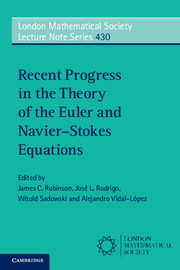Book contents
- Frontmatter
- Dedication
- Contents
- Preface
- List of contributors
- 1 Classical solutions to the two-dimensional Euler equations and elliptic boundary value problems, an overview
- 2 Analyticity radii and the Navier–Stokes equations: recent results and applications
- 3 On the motion of a pendulum with a cavity entirely filled with a viscous liquid
- 4 Modal dependency and nonlinear depletion in the three–dimensional Navier–Stokes equations
- 5 Boussinesq equations with zero viscosity or zero diffusivity: a review
- 6 Global regularity versus finite-time singularities: some paradigms on the effect of boundary conditions and certain perturbations
- 7 Parabolic Morrey spaces and mild solutions of the Navier–Stokes equations. An interesting answer through a silly method to a stupid question
- 8 Well-posedness for the diffusive 3D Burgers equations with initial data in H½
- 9 On the Fursikov approach to the moment problem for the three-dimensional Navier–Stokes equations
- 10 Some probabilistic topics in the Navier–Stokes equations
6 - Global regularity versus finite-time singularities: some paradigms on the effect of boundary conditions and certain perturbations
Published online by Cambridge University Press: 05 January 2016
- Frontmatter
- Dedication
- Contents
- Preface
- List of contributors
- 1 Classical solutions to the two-dimensional Euler equations and elliptic boundary value problems, an overview
- 2 Analyticity radii and the Navier–Stokes equations: recent results and applications
- 3 On the motion of a pendulum with a cavity entirely filled with a viscous liquid
- 4 Modal dependency and nonlinear depletion in the three–dimensional Navier–Stokes equations
- 5 Boussinesq equations with zero viscosity or zero diffusivity: a review
- 6 Global regularity versus finite-time singularities: some paradigms on the effect of boundary conditions and certain perturbations
- 7 Parabolic Morrey spaces and mild solutions of the Navier–Stokes equations. An interesting answer through a silly method to a stupid question
- 8 Well-posedness for the diffusive 3D Burgers equations with initial data in H½
- 9 On the Fursikov approach to the moment problem for the three-dimensional Navier–Stokes equations
- 10 Some probabilistic topics in the Navier–Stokes equations
Summary
Abstract
In light of the question of finite-time blowup versus global well-posedness of solutions to problems involving nonlinear partial differential equations, we provide several cautionary examples to indicate that modifications to the boundary conditions or to the nonlinearity of the equations can effect whether the equations develop finite-time singularities. In particular, we aim to underscore the idea that in analytical and computational investigations of the blow-up of the three-dimensional Euler and Navier–Stokes equations, the boundary conditions may need to be taken into greater account. We also examine a perturbation of the nonlinearity by dropping the advection term in the evolution of the derivative of the solutions to the viscous Burgers equation, which leads to the development of singularities not present in the original equation, and indicates that there is a regularizing mechanism in part of the nonlinearity. This simple analytical example corroborates recent computational observations in the singularity formation of fluid equations.
Introduction
A fundamental goal in the study of nonlinear initial boundary value problems involving partial differential equations is to determine whether solutions to a given equation develop a singularity in finite time. Resolving the issue of finite-time blow-up is important, in part because it can have bearing on the physical relevance and validity of the underlying model. However, determining the answer to this question is notoriously difficult for a wide range of equations, the 3D Navier–Stokes and Euler equations for incompressible fluid flow being perhaps the most well-known examples. Given that attacking the question directly is so challenging, many researchers have looked for other routes. One route is to try to simplify or modify the boundary conditions in an attempt to gain evidence for or against the occurrence of finite-time blow-up. A second route is to modify the equations in some way, and to study the modified equations with the hope of gaining insight into the blow-up of solutions to the original equations.
In this paper, we will examine several case studies related to such approaches. A major aim of the present work is to provide examples that demonstrate that one must be extremely cautious in generalizing claims about the blow-up of problems studied in idealized settings to claims about the blow-up of the original problem.
- Type
- Chapter
- Information
- Publisher: Cambridge University PressPrint publication year: 2016
- 4
- Cited by

